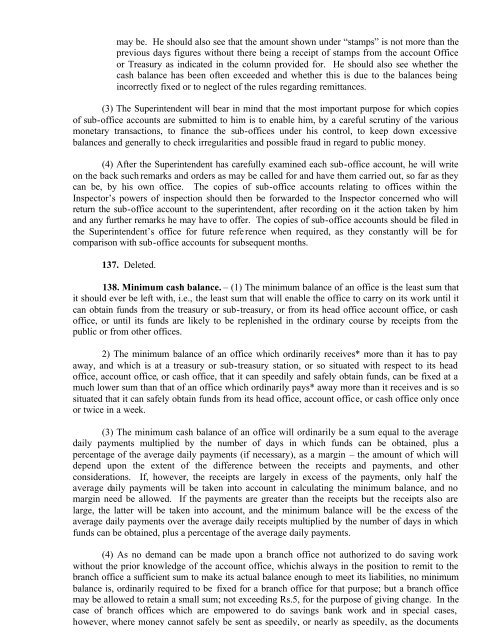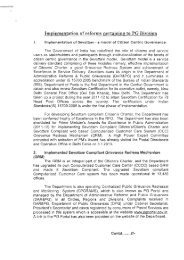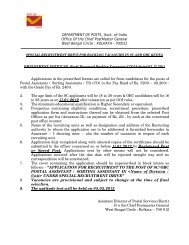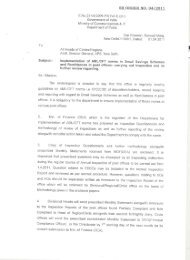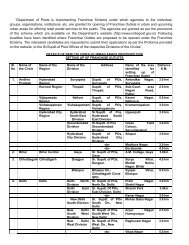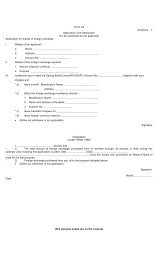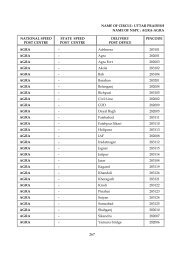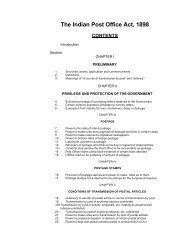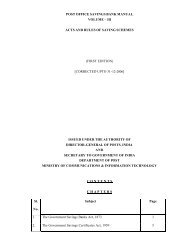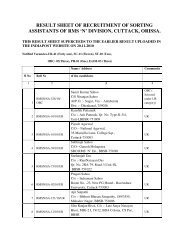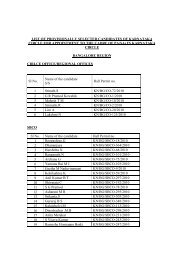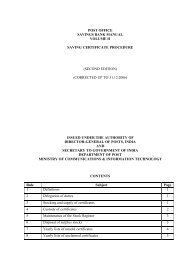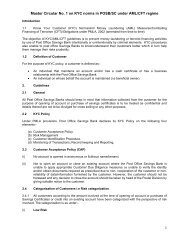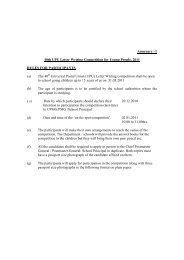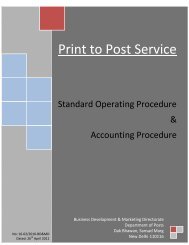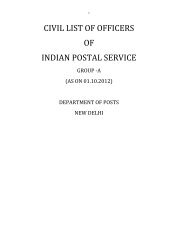Postal Manual Vol. VIII - India Post
Postal Manual Vol. VIII - India Post
Postal Manual Vol. VIII - India Post
You also want an ePaper? Increase the reach of your titles
YUMPU automatically turns print PDFs into web optimized ePapers that Google loves.
may be. He should also see that the amount shown under “stamps” is not more than the<br />
previous days figures without there being a receipt of stamps from the account Office<br />
or Treasury as indicated in the column provided for. He should also see whether the<br />
cash balance has been often exceeded and whether this is due to the balances being<br />
incorrectly fixed or to neglect of the rules regarding remittances.<br />
(3) The Superintendent will bear in mind that the most important purpose for which copies<br />
of sub-office accounts are submitted to him is to enable him, by a careful scrutiny of the various<br />
monetary transactions, to finance the sub-offices under his control, to keep down excessive<br />
balances and generally to check irregularities and possible fraud in regard to public money.<br />
(4) After the Superintendent has carefully examined each sub-office account, he will write<br />
on the back such remarks and orders as may be called for and have them carried out, so far as they<br />
can be, by his own office. The copies of sub-office accounts relating to offices within the<br />
Inspector’s powers of inspection should then be forwarded to the Inspector concerned who will<br />
return the sub-office account to the superintendent, after recording on it the action taken by him<br />
and any further remarks he may have to offer. The copies of sub-office accounts should be filed in<br />
the Superintendent’s office for future reference when required, as they constantly will be for<br />
comparison with sub-office accounts for subsequent months.<br />
137. Deleted.<br />
138. Minimum cash balance. – (1) The minimum balance of an office is the least sum that<br />
it should ever be left with, i.e., the least sum that will enable the office to carry on its work until it<br />
can obtain funds from the treasury or sub-treasury, or from its head office account office, or cash<br />
office, or until its funds are likely to be replenished in the ordinary course by receipts from the<br />
public or from other offices.<br />
2) The minimum balance of an office which ordinarily receives* more than it has to pay<br />
away, and which is at a treasury or sub-treasury station, or so situated with respect to its head<br />
office, account office, or cash office, that it can speedily and safely obtain funds, can be fixed at a<br />
much lower sum than that of an office which ordinarily pays* away more than it receives and is so<br />
situated that it can safely obtain funds from its head office, account office, or cash office only once<br />
or twice in a week.<br />
(3) The minimum cash balance of an office will ordinarily be a sum equal to the average<br />
daily payments multiplied by the number of days in which funds can be obtained, plus a<br />
percentage of the average daily payments (if necessary), as a margin – the amount of which will<br />
depend upon the extent of the difference between the receipts and payments, and other<br />
considerations. If, however, the receipts are largely in excess of the payments, only half the<br />
average daily payments will be taken into account in calculating the minimum balance, and no<br />
margin need be allowed. If the payments are greater than the receipts but the receipts also are<br />
large, the latter will be taken into account, and the minimum balance will be the excess of the<br />
average daily payments over the average daily receipts multiplied by the number of days in which<br />
funds can be obtained, plus a percentage of the average daily payments.<br />
(4) As no demand can be made upon a branch office not authorized to do saving work<br />
without the prior knowledge of the account office, whichis always in the position to remit to the<br />
branch office a sufficient sum to make its actual balance enough to meet its liabilities, no minimum<br />
balance is, ordinarily required to be fixed for a branch office for that purpose; but a branch office<br />
may be allowed to retain a small sum; not exceeding Rs.5, for the purpose of giving change. In the<br />
case of branch offices which are empowered to do savings bank work and in special cases,<br />
however, where money cannot safely be sent as speedily, or nearly as speedily, as the documents


